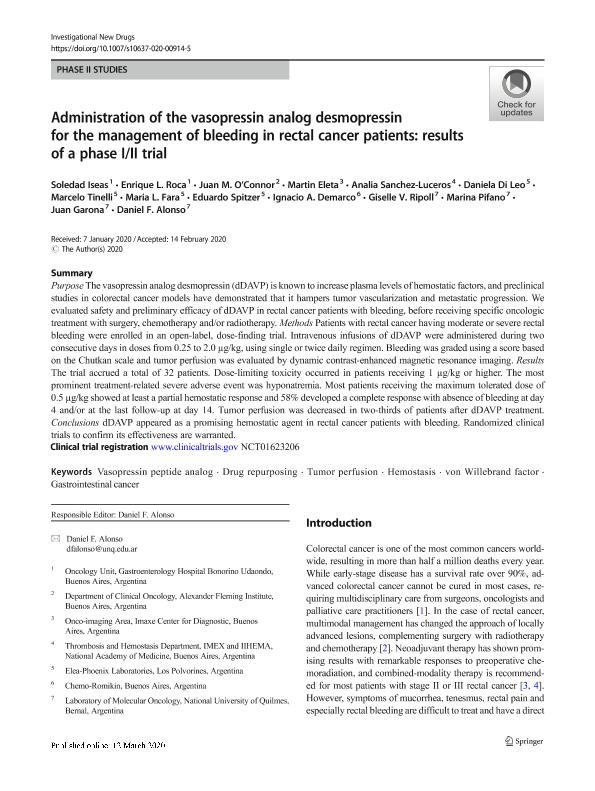Mostrar el registro sencillo del ítem
dc.contributor.author
Iseas, Soledad
dc.contributor.author
Roca, Enrique Luis

dc.contributor.author
O´Connor, Juan M.
dc.contributor.author
Eleta, Martin
dc.contributor.author
Sánchez Luceros, Analía Gabriela

dc.contributor.author
Di Leo, Maria Daniela

dc.contributor.author
Tinelli, Marcelo
dc.contributor.author
Fara, Maria L.
dc.contributor.author
Spitzer, Eduardo
dc.contributor.author
Demarco, Ignacio A.
dc.contributor.author
Ripoll, Giselle Vanina

dc.contributor.author
Pifano, Marina

dc.contributor.author
Garona, Juan

dc.contributor.author
Alonso, Daniel Fernando

dc.date.available
2022-05-09T17:18:19Z
dc.date.issued
2020-03
dc.identifier.citation
Iseas, Soledad; Roca, Enrique Luis; O´Connor, Juan M.; Eleta, Martin; Sánchez Luceros, Analía Gabriela; et al.; Administration of the vasopressin analog desmopressin for the management of bleeding in rectal cancer patients: results of a phase I/II trial; Springer; Investigational New Drugs; 38; 3-2020; 1580-1587
dc.identifier.issn
0167-6997
dc.identifier.uri
http://hdl.handle.net/11336/156955
dc.description.abstract
Purpose: The vasopressin analog desmopressin (dDAVP) is known to increase plasma levels of hemostatic factors,and preclinical studies in colorectal cancer models have demonstrated that it hampers tumor vascularization and metastatic progression. We evaluated safety and preliminary efficacy of dDAVP in rectal cancer patients with bleeding, before receiving specific oncologic treatment with surgery, chemotherapy and/or radiotherapy. Methods: Patients with rectal cancer having moderate or severe rectal bleeding were enrolled in an open-label, dose-finding trial. Intravenous infusions of dDAVP were administered during two consecutive days in doses from 0.25 to 2.0 µg/kg, using single or twice daily regimen. Bleeding was graded using a score based on the Chutkan scale and tumor perfusion was evaluated by dynamic contrast-enhanced magnetic resonance imaging. Results: The trial accrued a total of 32 patients. Dose-limiting toxicity occurred in patients receiving 1 µg/kg or higher. The most prominent treatment-related severe adverse event was hyponatremia. Most patients receiving the maximum tolerated dose of 0.5 µg/kg showed at least a partial hemostatic response and 58% developed a complete response with absence of bleeding at day 4 and/or at the last follow-up at day 14. Tumor perfusion was decreased in two-thirds of patients after dDAVP treatment. Conclusions: dDAVP appeared as a promising hemostatic agent in rectal cancer patients with bleeding. Randomized clinical trials to confirm its effectiveness are warranted.
dc.format
application/pdf
dc.language.iso
eng
dc.publisher
Springer

dc.rights
info:eu-repo/semantics/openAccess
dc.rights.uri
https://creativecommons.org/licenses/by/2.5/ar/
dc.subject
DESMOPRESSIN
dc.subject
RECTAL CANCER
dc.subject
BLEEDING CONTROL
dc.subject
ANTITUMORAL
dc.subject
VASOPRESSIN PEPTIDE ANALOG
dc.subject
DRUG REPURPOSING
dc.subject
TUMOR PERFUSION
dc.subject
HEMOSTASIS
dc.subject
VON WILLEBRAND FACTOR
dc.subject
GASTROINTESTINAL CANCER
dc.subject.classification
Oncología

dc.subject.classification
Medicina Clínica

dc.subject.classification
CIENCIAS MÉDICAS Y DE LA SALUD

dc.title
Administration of the vasopressin analog desmopressin for the management of bleeding in rectal cancer patients: results of a phase I/II trial
dc.type
info:eu-repo/semantics/article
dc.type
info:ar-repo/semantics/artículo
dc.type
info:eu-repo/semantics/publishedVersion
dc.date.updated
2022-05-02T17:15:36Z
dc.journal.volume
38
dc.journal.pagination
1580-1587
dc.journal.pais
Alemania

dc.journal.ciudad
Berlin
dc.description.fil
Fil: Iseas, Soledad. Gobierno de la Ciudad de Buenos Aires. Hospital de Gastroenterología "Dr. Carlos B. Udaondo"; Argentina
dc.description.fil
Fil: Roca, Enrique Luis. Gobierno de la Ciudad de Buenos Aires. Hospital de Gastroenterología "Dr. Carlos B. Udaondo"; Argentina
dc.description.fil
Fil: O´Connor, Juan M.. Instituto Alexander Fleming; Argentina
dc.description.fil
Fil: Eleta, Martin. Imaxe Centro de Diagnóstico por Imágenes; Argentina
dc.description.fil
Fil: Sánchez Luceros, Analía Gabriela. Consejo Nacional de Investigaciones Científicas y Técnicas; Argentina. Academia Nacional de Medicina de Buenos Aires; Argentina
dc.description.fil
Fil: Di Leo, Maria Daniela. Laboratorio Elea; Argentina
dc.description.fil
Fil: Tinelli, Marcelo. Laboratorio Elea-Phoenix; Argentina
dc.description.fil
Fil: Fara, Maria L.. Laboratorio Elea-Phoenix; Argentina
dc.description.fil
Fil: Spitzer, Eduardo. Laboratorio Elea-Phoenix; Argentina
dc.description.fil
Fil: Demarco, Ignacio A.. Romikin S.A. Laboratorio de Investigación y Desarrollo; Argentina
dc.description.fil
Fil: Ripoll, Giselle Vanina. Consejo Nacional de Investigaciones Científicas y Técnicas; Argentina. Universidad Nacional de Quilmes. Departamento de Ciencia y Tecnología. Laboratorio de Oncología Molecular; Argentina
dc.description.fil
Fil: Pifano, Marina. Consejo Nacional de Investigaciones Científicas y Técnicas; Argentina. Universidad Nacional de Quilmes. Departamento de Ciencia y Tecnología. Laboratorio de Oncología Molecular; Argentina
dc.description.fil
Fil: Garona, Juan. Consejo Nacional de Investigaciones Científicas y Técnicas; Argentina. Universidad Nacional de Quilmes. Departamento de Ciencia y Tecnología. Laboratorio de Oncología Molecular; Argentina
dc.description.fil
Fil: Alonso, Daniel Fernando. Consejo Nacional de Investigaciones Científicas y Técnicas; Argentina. Universidad Nacional de Quilmes. Departamento de Ciencia y Tecnología. Laboratorio de Oncología Molecular; Argentina
dc.journal.title
Investigational New Drugs

dc.relation.alternativeid
info:eu-repo/semantics/altIdentifier/url/http://link.springer.com/10.1007/s10637-020-00914-5
dc.relation.alternativeid
info:eu-repo/semantics/altIdentifier/doi/http://dx.doi.org/10.1007/s10637-020-00914-5
Archivos asociados
